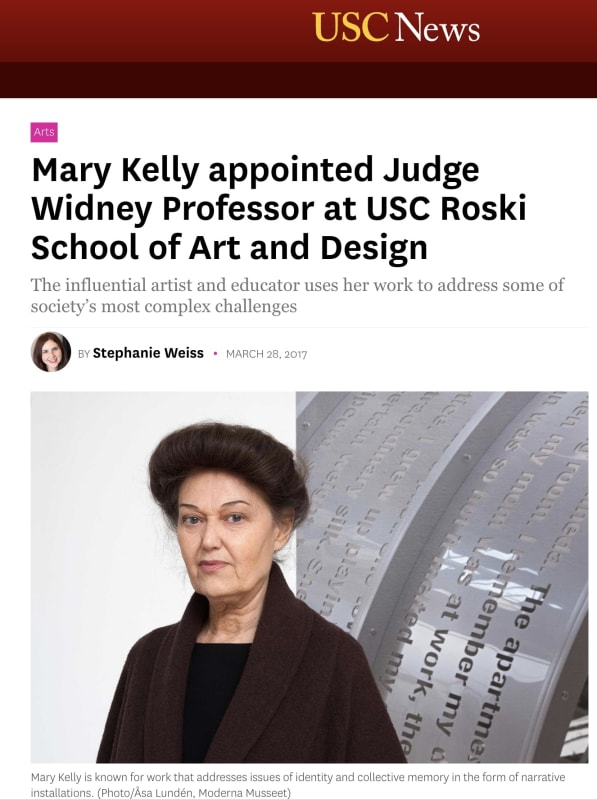World-renowned artist, scholar and educator Mary Kelly has been named a Judge Widney Professor at the USC Roski School of Art and Design.
Known for projects that address issues of sexuality, identity and collective memory in the form of large-scale narrative installations, Kelly’s fresh voice has influenced the evolution and critique of conceptual art. From early works exploring the mother-child relationship through a series of works focused on war and, most recently, on intergenerational history, her practice continues to drive and inform debates around feminism and postmodernism in art.
“We believe strongly in the ability of artists to spur social change and to that end, Mary Kelly is a leader,” said USC Provost Michael Quick. “As one of the world’s foremost feminist artists, Professor Kelly uses her work to address some of the most complex problems and challenges in our society. We are honored to have her join our faculty.”
Erica Muhl, dean of USC Roski, added, “Mary Kelly’s work as an artist and scholar has become pivotal to the development of contemporary art since 1970. Her extraordinary contributions to arts practice and arts pedagogy, including her groundbreaking work with graduate students, is known and esteemed worldwide. Her vision and experience will complement that of USC Roski’s existing roster of world-class faculty and help to set the stage for the next decade in the school’s advancement.”
The Widney Professorship, named after Judge Robert Maclay Widney, the university’s founder, is reserved for exemplary scholars and practitioners in the arts, sciences, humanities, business and leadership. Kelly will be the first woman to hold this position. As a Widney Professor of Art, she will join the faculty at USC Roski, providing mentorship and educational opportunities to the school’s students and further advancing the school as a center of exceptional artistry and critical thought. Following the hires of Suzanne Lacy, Nao Bustamante, Patty Chang, Keith Mayerson, Kori Newkirk and Edgar Arceneaux, Kelly’s appointment affirms the school’s commitment to providing the highest quality of education for its students.
Most influential
Kelly has been long considered one of the most influential artists working today. Her work has been exhibited by leading institutions around the world, including the Institute for Contemporary Art (London), The New Museum (New York), Moderna Museet (Stockholm), The Vancouver Art Gallery, Generali Foundation (Vienna), Museum of Contemporary Art Los Angeles, MOCA Chicago, Museo de Bellas Artes de Bilbao, Tate Britain, Tate Modern, Haus der Kunst (Munich) and the Musée National d’Art Moderne (Centre Pompidou) Paris, and in international exhibitions such as The Whitney Biennial (1991, 2004), The Biennale of Sydney (1984, 2008) and documenta 12.
Noted for her theoretical writings on art, Kelly’s published works include Imaging Desire (MIT Press, 1996) and Post-Partum Document (University of California Press, 1983/1998). She is a recipient of fellowships from the National Endowment for the Arts and the John Simon Guggenheim Memorial Foundation, as well as honorary doctorates from the University of Wolverhampton (England) and Lund University (Sweden).
From the start
Kelly began studying painting in Florence, Italy, in the early 1960s. For her first job, she moved to Beirut, Lebanon, to teach art at the Lebanese American University, where she immersed herself in French literature and philosophy. After war broke out in 1967, Kelly moved to London for postgraduate work at the Saint Martin’s School of Art in London, where she began her lifelong evaluation of conceptualism. She became an active member of the early women’s movement, working to support the unionization of women and becoming a founder of the first union for artists. During the 1970s, she worked with the Berwick Street Film Collective on the influential documentary art film, The Nightcleaners, and collaborated with other artists on the installation Women & Work: a document on the division of labor in industry (1973-75), as well as realizing her iconic six-part project, Post-Partum Document (1973-79).
Kelly continued to interrogate womens’ relation to the body, money, history and power in her four-part project, Interim (1984-89). During the 1990s, she focused on the issue of war, developing the ephemeral medium of compressed lint to form text in intaglio and realizing an exhibition, The Ballad of Kastriot Rexhepi (2001), which consisted of a 200-foot linear relief and live performance of an original score by composer Michael Nyman. Love Songs (2005-07), which featured prominently in documenta 12, included a collaboration with younger women on the restaging of the 1971 Miss World protest, as well as the production of a three-dimensional work composed of intergenerational narratives reflecting on feminism.
In 1989, Kelly joined the faculty of the Independent Study Program at the Whitney Museum of American Art in New York. Kelly comes to USC following a 21-year tenure as distinguished professor of art and critical theory in the School of the Arts and Architecture at UCLA, where she established the Interdisciplinary Studio area for graduate students engaged in site-specific, collective and project-based practices.

